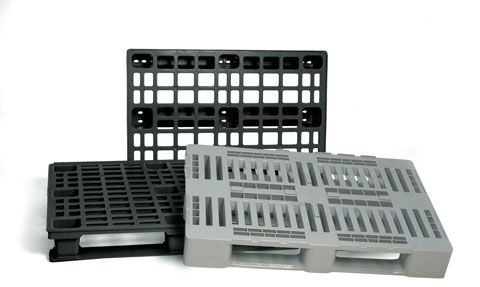3 Ways That Plastic Pallets Help Improve Supply Chain Management
05 Apr 2018
Plastic pallets have been growing in popularity in recent years. This is especially true given the advances in technology which have seen supply chains using more automated storage applications where added precision is crucial. A study carried out by Peerless Media Group recently found that while 90% of the companies they surveyed in the USA still used wood pallets, 37% of them were also using plastic. A number were reported to have completely replaced wood pallets in preference to plastic ones. But why is this change happening and how can plastic pallets aid in improving supply chain management?

Less Waste and Cost
One of the reasons is that plastic pallets are proving to be far more durable than their wooden counterparts. Recent tests involving whitewood stringer pallets and plastic pallets showed the latter were able to carry out 200 sequences of forklift handling, trailer loading and floor loading with a 680kg weight before failure occurred. The whitewood pallets managed just 11 cycles. This is due to the plastic pallet’s design. it is built for durability and this enables the pallet to withstand both aggressive environments and forceful handling. It can also be used repeatedly, unlike wooden pallets, meaning that both waste and costs are significantly reduced.
Cleaner and Safer
One of the main complaints about wooden pallets is the residue that is left behind on machines. This in turn can lead to costly line shutdowns due to the necessary cleaning of supply chain machinery, which does not aid in improving supply chain management. Plastic pallets are also safer and cleaner and don’t have the associated risk of splinters and sharp nails, which can harm workers and contaminate products. This is especially important with regards to the transportation of perishable goods such as food and drink. The non-porous design of the plastic stops moisture, odour and other particles being absorbed into the pallets which can then go on to affect the conditioning of the product. Cleaning is also much easier, as they can be washed at very high temperatures and are fast-drying.
Support High-Velocity Automated Systems
As automation levels increase, so do calls for the implementation of standardised pallets that can interface smoothly across all kinds of high-speed automated equipment, improving supply chain management and overall efficiency. Pallets are one of the most important aspects of the supply chain and are in contact with the product at every stage in the supply chain process. As supply chains become more regulated and automated, the future will see more and more use of plastic pallets. The advantages they have over regular wooden pallets are manifold, given their cost-effectiveness, waste reduction, cleanliness, safer design and ability to adapt to support high-velocity automated systems.
